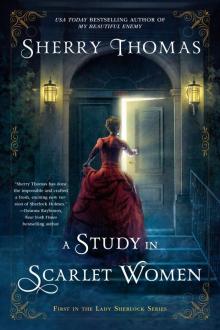- Home
- Sherry Thomas
The Hollow of Fear Page 22
The Hollow of Fear Read online
Page 22
“Thank you, Mr. Holmes. I mustn’t keep you any longer from your meeting.”
Charlotte Holmes inclined her head. “Good day, gentlemen.”
When she was out of earshot, Fowler said to Treadles, “Do you realize what this means, Inspector?”
After Treadles’s initial dismay, a sense of relief had washed over him. If the child truly was not Lord Ingram’s, then Lady Ingram’s pregnancy gave great credence to his assertion that she had defected with her lover. But Fowler seemed almost gleeful—never a good sign—so he erred on the side of caution. “Yes, sir?”
“It means that now we have a motive that is much stronger than Lord Ingram’s desire to marry Miss Charlotte Holmes. What would your reaction be, Inspector, if your missing wife turned up carrying another man’s child?”
Treadles blinked, unable to even contemplate the idea.
Fowler nodded with satisfaction. “My point exactly.”
* * *
Livia leaped up when Charlotte came into the white drawing room. “Have you learned anything?”
“Not enough yet. Have you been well?”
“I . . . I don’t know, frankly.”
This morning Livia had received two notes. One came from Lord Ingram, informing her that he had written to his solicitor to begin the process of looking into Moreton Close, the institute now in charge of Bernadine. The other one was unsigned and without a return address but had been postmarked at the nearest village post office.
It read, I have been looking for the Sherlock Holmes story everywhere. Has it been published yet? If not, please hurry.
She was terrified for Lord Ingram, worried about Charlotte, frustrated with herself, and yet, with the arrival of this second note, so extravagantly buoyed that she could have walked over a carpet of rose petals and not bruised a single one.
He knew she was at Mrs. Newell’s. And he was nearby. Had he come to meet her? How would he make it happen?
She became aware that her sister was observing her. “What about you, Charlotte?” she said, her face warming. “Have you been busy?”
“Rather,” said Charlotte. “You?”
Livia scoffed. “What does a near-spinster have to do?”
At least Mrs. Newell enjoyed her company, something that couldn’t be said for Lady Holmes. She was grateful that Mrs. Newell had asked her to stay, knowing how much she disliked going home, but she also wished she didn’t need to rely on someone else’s goodwill for a respite from her own parents.
“What about your story?”
“Haven’t been able to write a word since I saw Lady Ingram in that icehouse.” She expelled a long breath. “But at least I heard from Lord Ingram. I asked him to help me look into Moreton Close and he’s written his solicitor, as he’d promised.”
Charlotte nodded. “I’m glad you referred the matter to him—that gives him something to do.”
“I was surprised that I didn’t need to tell him who Bernadine was—to the wider world she might as well not exist.”
“I mentioned her in a letter. He was taken aback to learn that there are not three but four Holmes girls.”
Livia sighed. “Poor Bernadine. I hope Moreton Close is exactly what it purports to be—a haven for women like her. But I can’t stop worrying. If she’s mistreated, she wouldn’t even be able to tell anyone.”
Bernadine had never spoken. And she certainly didn’t know how to read or write.
Charlotte made no reply. Livia was used to these conversational lulls with her sister. She was probably assessing the chances of Lord Ingram’s solicitors meeting with success at Moreton Close.
“Asylums, both public and private, are regularly inspected. That’s the law,” Charlotte eventually said. “Moreton Close is not operating in a vacuum. So let’s hope for the best.”
And that Lord Ingram’s solicitors worked fast.
Charlotte gave Livia’s hand a quick squeeze. “Look after yourself. I have some matters to investigate in London.”
As Charlotte made her way to the door, it occurred to Livia that she wanted to ask her sister about the nameless young man who had pretended to be Mr. Myron Finch, their illegitimate brother. Who was he? And what did Charlotte know about him?
But by the time she screwed up her courage, Charlotte had already left.
* * *
The policemen’s conversation with Mrs. Newell’s cook was brief. Yes, a slab of ice had been sent. And it had been sent because Mrs. Newell had specifically requested so.
Now they were waiting to speak to Mrs. Newell again. Chief Inspector Fowler having gone to use the commode, Treadles was alone in the foyer when Charlotte Holmes came out from the white drawing room.
On her way to the front door she passed him and nodded. “Good day, Inspector.”
“Mr. Holmes,” he said. “A moment, please. I have a question for you.”
“Yes, Inspector?”
He didn’t know why he had stopped her. And now that he had, he had no idea whether he could condense all the whirling thoughts in his head into a single question.
“I have, or so it would appear, offended Miss Olivia Holmes greatly.”
She waited for him to continue.
“I seem to have a knack for giving such offenses. Not to ladies like Miss Holmes usually, but to . . .” He paused, unsure how to phrase what he was about to say.
“But to women who are thoroughly lacking in respectability, with the very respectable Miss Holmes affronted on behalf of her disgraced sister.”
He thought of Mrs. Farr, with the possibly dead missing sister. He thought of Mrs. Bamber, the publican he had encountered a few months ago. He preferred to believe that they were exceptions, and perhaps they were. The problem was, he could too easily think of others, scattered throughout his career, like sand in a bowl of grain.
“I am a police inspector. I will need to speak to many more women in the course of my work. A tendency to provoke is . . . not a personal asset.”
She waited again. When it became apparent he had confessed as much as he could bring himself to, she said, “Should I assume that you do not entirely understand how—or why—your words give rise to such unfavorable responses?”
He nodded stiffly, already regretting the conversation.
“I can’t speak for other women, but perhaps in the case of Miss Holmes, I can offer some explanation. Her sister Charlotte had always understood, from an early age, that she was ill-suited for marriage. She had an agreement with her father that if by her twenty-fifth birthday, she still hadn’t changed her mind, he would sponsor her to attend school and receive training, so that someday she might become headmistress of a girls’ school, a respectable position with respectable remuneration attached.
“When the day came, her father reneged on his promise. Charlotte Holmes was faced with the choice of either entering into a marriage she did not want or remaining forever under the roof—and thumb—of a faithless father.”
Treadles had no idea of the circumstances surrounding her disgrace. He couldn’t imagine any good reason for her to have done what she did, so he’d decided that she’d slept with a man as nothing other than an amoral lark.
“Neither was acceptable to her. So she strived to create a third alternative. She would get rid of her maidenhead and use that loss to blackmail her father into coughing up the funds for her education.”
Treadles’s shock and dismay must have shown in his face, for her expression became ironic. “Yes, a terrible idea, but she had no other resources to call on. Women of her class are molded to be ornaments. She was willing to work for her own support, but she had few skills worth mentioning. And she was not so naive as to think that she could toil her way up from the floor of a factory—factories don’t pay women enough to live on, the reason many must prostitute themselves besides, to supplement that meager income.”
>
Treadles couldn’t stop his brows from rising. He knew about the likelihood of female factory workers also being prostitutes—but had always assumed that it must be because factories attracted a less chaste class of women.
“In the end, Charlotte Holmes went ahead with her plan, which had seemed to her the least terrible of all choices. Things went awry. She found herself faced with a new set of undesirable choices: to be confined for the rest of her life—or to run away and take her chances in the wilds of London.
“Thanks to the kindness of friends, she did not starve. Today one might say she is faring rather tolerably. All the same, what she did was a desperate gamble at a desperate moment, when she felt as if she would never again have any say in her own life.
“Miss Olivia Holmes does not blame her sister for either her initial choice or what happened subsequently, because she herself feels that same desperation daily, the sinking sensation that what will happen to her is entirely out of her hands.
“When you brought up her sister’s sins before her, it was with an intention to shame. Perhaps you yourself were not aware of that—perhaps you thought of it as merely pointing out the facts—but it’s nevertheless true.
“For Miss Olivia Holmes, who knows the entire story, to hear it reduced to one single choice, shorn of all context, and casually judged as degenerate . . . I believe to her it felt unjust. And acted as a painful reminder of the narrow confines of her own life: She can either continue to live in accordance with her parents’ demands—and wither a little every day—or she can defy conventions and be called a shameless hussy for the rest of her life.”
Miss Holmes spoke calmly, without rancor. But Treadles’s ears burned—and his face, too. He wasn’t sure he understood everything she said, but he did understand now why he had asked her the question in the first place.
Not to find out why the women had reacted as they had, but in the hope that she, with her uncompromisingly logical mind, would tell him that they were but being unreasonable.
Hysterical, even.
“Thank you,” he said numbly.
“I’m sorry. I do tend to tell people exactly what they don’t wish to hear.” She sighed softly. “I might as well add, since we are on the topic, that perhaps some of the women’s reactions have to do with your face. You have an open, amiable mien, which might lead those speaking with you to expect understanding. And yet your judgment is such a pointed, implacable thing, as if you are the personification of the larger world they have known, the one that has thwarted them at every turn.”
He might have mumbled something in reply. She bade him good day and walked out of the front door.
“Was that Mr. Holmes?” said Chief Inspector Fowler a minute later, startling Treadles.
“Yes, that was.”
“Hmm,” said Fowler, studying Charlotte Holmes’s retreating back. “There goes a man far more dangerous than he looks.”
* * *
Mrs. Newell did not pretend to be pleased that she must speak to the police again. Faced with her aloofness, Chief Inspector Fowler dispensed with small talk. “Ma’am, I understand that you yourself gave the order to send ice to Stern Hollow. Why?”
“Lord Ingram asked me to. He said that one of their freezing pots is missing, if I wouldn’t mind sending one from my kitchen, so that my guests would be able to enjoy the cold dishes that they are accustomed to. And would I not mind sending some ice along with the freezing pot.”
Treadles went cold. What reason could Lord Ingram have for requesting ice from a neighbor, when he had several tons of perfectly good ice waiting in his icehouse?
“Did he mention why he wanted you to send ice?”
“He didn’t. But I was delighted to oblige, since he was doing me the far larger favor by taking in all my guests. My kitchen staff already had a block of ice in an ice safe and it was very little trouble to send it along with all the food that would have otherwise gone to waste.”
“Why did you not mention this when we last spoke?”
“You didn’t ask.”
“Mrs. Newell, withholding evidence from the police, in the course of a murder investigation, is a serious offense. I didn’t ask because I didn’t know enough to inquire in that particular direction, but you knew the significance of what you were not telling us.”
The old woman wrinkled her nose. “Why should I volunteer information that might send an innocent man to the gallows?”
“What makes you still think that he is innocent?”
“What makes you think he is guilty?”
“Simply from what you’ve told us, it’s obvious that Lord Ingram was hiding something. He requested for you to supply the ice so that none of his servants would need to go near the icehouse.”
There could be no other conclusion, yet Treadles still cringed to hear it said aloud.
If Lord Ingram killed his wife, then he could never again appear before Miss Holmes.
Mrs. Newell had said that, Mrs. Newell who was obviously biased in favor of Lord Ingram. But Treadles clung to that statement, to the implied integrity of Miss Holmes.
Mrs. Newell, unlike him, was not disheartened by Fowler’s charge. “If that were the case, wouldn’t Lord Ingram have made sure no one entered the icehouse the next day as well? Why would a servant be able to waltz in a mere twenty-four hours later?”
“Perhaps he underestimated how much ice the kitchen needed. Perhaps he thought the amount you supplied would be enough to last the entirety of your guests’ sojourn at Stern Hollow.”
Mrs. Newell scoffed. “Would you make such assumptions, Chief Inspector, if you had your wife’s dead body lying in a structure that is sure to be visited at some point by members of your staff? Lord Ingram is not stupid. And any inference of guilt that starts with him doing something stupid is, by default, a line of reasoning that must be rejected.”
* * *
The fog was still rampant when they left Mrs. Newell’s house but had begun to clear by the time they reached Stern Hollow. Instead of calling for an interview with Lord Ingram, Chief Inspector Fowler requested to speak to his valet, Cummings.
They had already spoken to Cummings once, when they had interviewed all the other servants. When Treadles consulted his notes, he saw that Fowler had already written, in the margins, Need to question this man again.
“Mr. Cummings, do you recognize these boots?”
Cummings, a small, neat man, examined the contents of the boot box, which had been taken from Lord Ingram’s dressing room the evening before. “They belong to Lord Ingram.”
“You have seen them before?”
“Yes. They are quite old, from before I came to work for his lordship.”
“Are they usually kept in the dressing room?”
“No. Usually they are kept near one of the side entrances, along with his Wellington boots, for when he wishes to walk about the estate.”
“Were you not concerned they were no longer there?”
“Boots that are never worn in public do not fall under my purview, Chief Inspector. The hall boy has the responsibility of cleaning them. I check on them once in a while, to make sure he has done them properly. But I usually inspect only one of the side entrances at a time, and there are several in this house. If I don’t see a pair of boots at any given point in time, I assume that they have been stowed near one of the other doors.”
“Why do you suppose these boots have been stowed in the dressing room?”
“I can’t say, Chief Inspector.”
“You are responsible for Lord Ingram’s wardrobe, which means the dressing room should fall entirely under your purview. You didn’t think to ask his lordship about the appearance of these boots at a place they didn’t belong?”
“I might have, if they’d been put on my side of the dressing room,” said Cummings. “The innermost quarter or so of th
e dressing room is where Lord Ingram keeps his letters, journals, portfolios, and such. I do not venture into that part of the dressing room. My instructions are clear. Even if I see something on his side that has clearly been misplaced, say, a necktie or a comb, that should have stayed on my side of the dressing room, I am to leave it alone and let his lordship sort it out in time.”
“So you have seen this boot box in the dressing room but not gone near it.”
“That’s correct, Chief Inspector.”
“How long has the boot box been in the dressing room?”
“Years.”
“Years?” Fowler frowned. “I see, let me ask a different question. When did it move to Lord Ingram’s side of the dressing room?”
Cummings bit his lower lip. “Two or three weeks ago. Three, most likely.”
“And of course you didn’t ask why.”
“No, indeed.”
“The boots have a great deal of coal dust encrusted on the soles. Where do you think they have been worn to?”
“I can’t imagine. The coal cellar would be the only place in the house where there might be some coal dust to be found.”
“If he goes to the coal cellar and comes back, surely you would have seen coal dust in the dressing room?”
Mr. Cummings hesitated.
“May I remind you, Mr. Cummings—”
“I understand I am to speak truthfully, Chief Inspector.”
“Has Lord Ingram demanded otherwise of you?”
“No. When Sergeant Ellerby came, his lordship asked the entire staff to be forthright and helpful when questioned by the police.”
“Then why the reluctance, Mr. Cummings?”
“I don’t know, Chief Inspector. But you are right, I’ve noticed coal dust lately in the dressing room.”
“Did you ask Lord Ingram about it?”
“No, I cleaned up and carried on with my duties.”
“Now, Mr. Cummings, has there been anything else about his lordship’s ambulatory habits of late that is out of the ordinary?”

_preview.jpg) Claiming the Duchess (Fitzhugh Trilogy Book 0.5)
Claiming the Duchess (Fitzhugh Trilogy Book 0.5) The Art of Theft
The Art of Theft The Magnolia Sword: A Ballad of Mulan
The Magnolia Sword: A Ballad of Mulan A Study In Scarlet Women
A Study In Scarlet Women The Hollow of Fear
The Hollow of Fear The Magnolia Sword
The Magnolia Sword Beguiling the Beauty ft-1
Beguiling the Beauty ft-1 The Heart is a Universe
The Heart is a Universe The Hidden Blade: A Prequel to My Beautiful Enemy (Heart of Blade)
The Hidden Blade: A Prequel to My Beautiful Enemy (Heart of Blade) Ravishing the Heiress ft-2
Ravishing the Heiress ft-2 The Immortal Heights
The Immortal Heights The Hidden Blade
The Hidden Blade Ravishing the Heiress
Ravishing the Heiress Tempting the Bride
Tempting the Bride The Luckiest Lady in London
The Luckiest Lady in London The Bride of Larkspear: A Fitzhugh Trilogy Erotic Novella
The Bride of Larkspear: A Fitzhugh Trilogy Erotic Novella Claiming the Duchess
Claiming the Duchess The One in My Heart
The One in My Heart His At Night
His At Night A Dance in Moonlight
A Dance in Moonlight A Conspiracy in Belgravia
A Conspiracy in Belgravia Not Quite a Husband
Not Quite a Husband